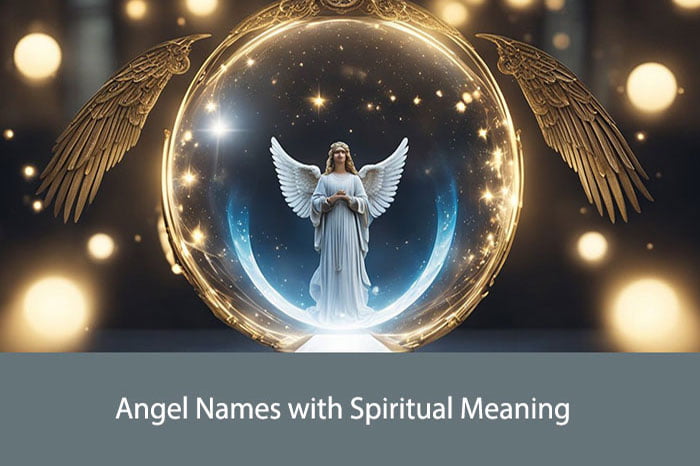Angel names have been a subject of fascination and intrigue for centuries. These celestial beings are often depicted as messengers of God, with each one possessing a unique set of qualities and attributes. Many people believe that knowing an angel’s name can help them connect with that angel and tap into its spiritual power.
There are many different angel names with spiritual meanings, each one representing a different aspect of the divine. Some of the most well-known angel names include Michael, Gabriel, Raphael, and Uriel. Each of these angels is associated with a specific element or quality, such as protection, healing, or wisdom.
In this article, we will explore the world of angel names and their spiritual significance. We will delve into the history of these celestial beings, as well as the different types of angels and their roles in the spiritual realm. Whether you are a believer in angels or simply curious about their significance, this article will provide you with a comprehensive overview of angel names and their spiritual meanings.
Origins of Angelic Names

When it comes to the origins of angelic names, there are various sources and cultural variations that have influenced the naming of angels throughout history. In this section, we will explore the biblical roots and cultural variations of angelic names.
Biblical Roots
The Bible is the primary source for the origins of angelic names. In the Old Testament, the Hebrew word for angel is “mal’akh,” which means “messenger.” The New Testament uses the Greek word “angelos,” which also means “messenger.” The Bible mentions several angels by name, such as Gabriel, Michael, and Raphael.
These angelic names often have significant spiritual meaning. For example, Gabriel means “God is my strength,” which reflects the angel’s role as a messenger of God’s word and strength. Michael means “who is like God,” which emphasizes the angel’s power and authority in carrying out God’s will. Raphael means “God has healed,” which highlights the angel’s role in healing and restoring.
Cultural Variations
Angel names and their meanings can vary across different cultures and religions. In Islamic tradition, for example, the archangel Gabriel is known as Jibril and is believed to have revealed the Quran to the prophet Muhammad. In Hinduism, the god Vishnu is often depicted with four arms, each holding a symbol of his power, including the conch shell, which represents the sound of creation.
In addition to cultural variations, angelic names can also be influenced by personal beliefs and experiences. Many people believe in guardian angels, who are assigned to protect and guide individuals throughout their lives. These guardian angels may be given names based on personal experiences or spiritual beliefs.
Overall, the origins of angelic names are diverse and complex, reflecting the spiritual beliefs and cultural traditions of different societies throughout history.
Understanding Spiritual Meanings
When it comes to understanding the spiritual meanings behind angel names, it is important to consider both their theological significance and mystical attributes. By examining the various aspects of these names, we can gain a deeper understanding of their spiritual significance.
Theological Significance
Theological significance refers to the religious or spiritual beliefs associated with a particular angel name. This can include their role in religious texts, their relationship with other angels or deities, and their connection to specific virtues or qualities.
For example, the name Michael is often associated with the concept of protection and is considered a powerful warrior in many religious traditions. Similarly, the name Gabriel is often associated with divine messages and is considered a messenger of God in many religious texts.
Mystical Attributes
Mystical attributes refer to the spiritual qualities or energies associated with a particular angel name. This can include their connection to specific colors, elements, or chakras, as well as their ability to assist with specific spiritual practices or goals.
For example, the name Ariel is often associated with the element of air and is believed to assist with communication and manifestation. Similarly, the name Raziel is often associated with the color purple and is believed to assist with spiritual insight and intuition.
By understanding both the theological significance and mystical attributes of angel names, we can gain a greater appreciation for their spiritual significance and the role they play in our lives.
Popular Angel Names and Their Meanings

As we explore the world of angels, we come across many names that hold great spiritual significance. In this section, we will delve into the meanings behind some of the most popular angel names.
Michael: Who is Like God
Michael is one of the most well-known angels, revered in many religions for his strength and protection. The name Michael means “Who is like God,” which reflects his unwavering devotion to the divine. He is often depicted carrying a sword, which represents his power to defend against evil forces.
Gabriel: God’s Strength
Gabriel is another prominent angel, known for his role as a messenger of God. The name Gabriel means “God’s strength,” which reflects his ability to deliver important messages with clarity and conviction. Gabriel is often depicted holding a trumpet, which represents his role in announcing important events.
Raphael: God’s Healing
Raphael is an angel associated with healing and compassion. The name Raphael means “God’s healing,” which reflects his ability to bring comfort and healing to those in need. Raphael is often depicted holding a staff and a fish, which represent his role in guiding and healing.
Uriel: God’s Light
Uriel is an angel associated with wisdom and enlightenment. The name Uriel means “God’s light,” which reflects his ability to illuminate the path of those seeking knowledge and understanding. Uriel is often depicted holding a flame, which represents his role in bringing light to the darkness.
In summary, these four popular angel names hold great spiritual significance and are revered for their unique qualities and abilities. Whether seeking protection, guidance, healing, or enlightenment, these angels offer a source of comfort and inspiration to many.
Lesser-Known Angelic Figures
As we explore the vast world of angelic figures, we come across some lesser-known ones that hold significant spiritual meaning. In this section, we will discuss three such figures: Raguel, Sariel, and Remiel.
Raguel: Friend of God
Raguel is an angel whose name means “Friend of God.” He is often associated with justice and harmony and is believed to be responsible for resolving conflicts between people. In some traditions, Raguel is considered to be one of the seven archangels. He is also known as the angel of fairness and is believed to help bring balance to our lives.
Sariel: God’s Command
Sariel is an angel whose name means “God’s Command.” He is often associated with divine justice and is believed to be responsible for punishing those who break God’s laws. Sariel is also known as the angel of death and is believed to help guide souls to the afterlife. In some traditions, Sariel is considered to be one of the seven archangels.
Remiel: Mercy of God
Remiel is an angel whose name means “Mercy of God.” He is often associated with compassion and forgiveness and is believed to be responsible for helping people find redemption. Remiel is also known as the angel of visions and is believed to help people interpret their dreams. In some traditions, Remiel is considered to be one of the seven archangels.
As we delve deeper into the world of angels, we realize that there are many lesser-known figures that hold great spiritual significance. Raguel, Sariel, and Remiel are just a few examples of these figures, each with their unique roles and responsibilities in the divine realm.
Angels in Different Religions
Christianity
In Christianity, angels are believed to be messengers of God who serve as intermediaries between God and humans. They are often depicted as winged beings with halos and are associated with the concepts of love, protection, and guidance. Some of the well-known angels in Christianity are Michael, Gabriel, and Raphael.
Judaism
In Judaism, angels are also seen as messengers of God and are believed to have the power to influence events in the world. They are often depicted as fiery beings and are associated with concepts such as justice, mercy, and wisdom. Some of the well-known angels in Judaism are Metatron, Sandalphon, and Uriel.
Islam
In Islam, angels are considered to be created from light and are believed to have no free will. They are seen as messengers of God who carry out His commands and are associated with concepts such as mercy, protection, and guidance. Some of the well-known angels in Islam are Jibril, Mikail, and Israfil.
Overall, angels play an important role in many religions and are seen as spiritual beings who serve as messengers of God. While their roles and characteristics may differ across different religions, they are often associated with concepts such as love, protection, and guidance.
Angelic Names in Contemporary Culture

We often encounter angelic names in contemporary culture, whether in literature, film, or music. These names are often used to evoke a sense of spirituality or divine intervention. Here are some examples of angelic names and their meanings:
- Gabriel: This name means “God is my strength” and is often associated with the angel who announced the birth of Jesus to Mary in the Bible. Gabriel is also a popular name for boys in many cultures.
- Raphael: This name means “God has healed” and is associated with the archangel who healed Tobit’s blindness in the Book of Tobit. Raphael is also a popular name for boys in many cultures.
- Uriel: This name means “God is my light” and is associated with the archangel who is said to have helped Noah build the ark in Jewish and Christian traditions.
- Michael: This name means “Who is like God?” and is associated with the archangel who defeated Satan in the Book of Revelation. Michael is also a popular name for boys in many cultures.
- Ariel: This name means “lion of God” and is associated with the angel who is said to have protected and guided the Israelites in the wilderness in Jewish and Christian traditions.
These names are often used in popular culture to add a sense of mysticism or spirituality to a character or story. For example, the character of Gabriel in the film “The Prophecy” is an angel who comes to Earth to prevent a war between angels and humans. In the television show “Supernatural,” the character of Castiel is an angel who helps the main characters in their fight against evil.
In addition to their use in popular culture, angelic names are also used in spiritual practices such as prayer and meditation. Many people believe that invoking the names of angels can bring protection, healing, and guidance. Whether used in fiction or in real life, angelic names continue to hold a special place in contemporary culture.
Naming Practices and Considerations
When it comes to choosing a name for an angel, there are various practices and considerations that one might take into account. In this section, we will explore some of these factors and how they can impact the choice of an angel name.
Personal Relevance
One important consideration when naming an angel is personal relevance. This can involve choosing a name that resonates with the individual who will be working with the angel, or selecting a name that reflects the qualities or attributes that the individual wishes to cultivate in themselves. For example, if an individual seeks to develop greater compassion, they may choose to work with an angel whose name reflects this quality, such as Ariel (meaning “lion of God”).
Cultural Resonance
Another factor to consider when naming an angel is cultural resonance. Many angel names have roots in various cultures and traditions, and choosing a name that aligns with one’s cultural heritage or spiritual path can add depth and meaning to the practice of working with angels. For example, the name Azrael (meaning “helper of God”) has significance in both Jewish and Islamic traditions.
When considering these and other factors, it is important to approach the naming of angels with intention and respect, recognizing the power and significance of these divine beings. By choosing a name that resonates with us personally or culturally, we can deepen our connection to the angels and invite their guidance and support into our lives.
Spiritual and Religious Contexts of Angelic Names

When it comes to angelic names, there are various spiritual and religious contexts that are associated with them. These contexts can provide insight into the meaning and significance of the names, and can help us understand the role that angels play in different belief systems.
In Christianity, for example, angels are seen as messengers of God and are often depicted as having specific roles and responsibilities. Some of the most well-known angelic names in Christianity include Gabriel, Michael, and Raphael. Gabriel is known as the messenger of God and is often associated with communication and revelation. Michael is known as the protector and defender of the faith, while Raphael is often associated with healing and guidance.
In Judaism, angels are also seen as messengers of God and are often associated with specific tasks and responsibilities. Some of the most well-known angelic names in Judaism include Metatron, Sandalphon, and Raziel. Metatron is known as the angel of life and is often associated with the Tree of Life in Kabbalistic teachings. Sandalphon is known as the angel of prayer and is said to collect the prayers of the faithful and present them to God. Raziel is often associated with mystical knowledge and is said to have written the Book of Secrets, which contains knowledge of the universe and its workings.
In Islam, angels are also seen as messengers of God and are often associated with specific tasks and responsibilities. Some of the most well-known angelic names in Islam include Jibril, Mika’il, and Israfil. Jibril is known as the angel of revelation and is said to have brought the Qur’an to the prophet Muhammad. Mika’il is often associated with mercy and is said to be responsible for providing sustenance to all living things. Israfil is known as the angel of the trumpet and is said to blow the trumpet on the Day of Judgment.
Overall, the spiritual and religious contexts of angelic names can provide us with insight into the role that angels play in different belief systems. By understanding the significance of these names, we can gain a deeper appreciation for the spiritual and religious traditions that they are associated with.
Frequently Asked Questions
What are some male angel names found in the Bible and their meanings?
Some of the male angel names found in the Bible include Michael, Gabriel, and Raphael. Michael means “who is like God”, Gabriel means “God is my strength”, and Raphael means “God has healed”. These names are associated with important roles in biblical narratives and are often seen as powerful and protective figures.
Can you list female angel names derived from biblical texts?
Some of the female angel names derived from biblical texts include Seraphim, Cherubim, and Ophanim. While these names are not typically associated with gender, they are often depicted as female in religious art and literature. They are also seen as important figures in the hierarchy of angels.
What names are associated with the role of a guardian angel?
Some of the names associated with the role of a guardian angel include Ariel, Cassiel, and Metatron. These names are often associated with protection and guidance, and are believed to be assigned to individuals to watch over and guide them throughout their lives.
Who is considered the warrior angel in religious texts?
The warrior angel in religious texts is often identified as Michael. He is seen as a powerful and protective figure who fights against evil and protects the faithful. In some traditions, he is also associated with the end times and the final battle between good and evil.
Which angelic names signify ‘light of God’ or similar concepts?
Some of the angelic names that signify “light of God” or similar concepts include Uriel, Jophiel, and Zadkiel. These names are often associated with wisdom, enlightenment, and spiritual growth.
What are some unique biblical names that carry a strong spiritual significance?
Some unique biblical names that carry a strong spiritual significance include Azrael, Barachiel, and Sariel. Azrael is associated with the angel of death, Barachiel is seen as the angel of blessings, and Sariel is often associated with the moon and lunar cycles. Each of these names carries a unique spiritual significance and is often associated with specific roles or attributes within angelic hierarchies.





